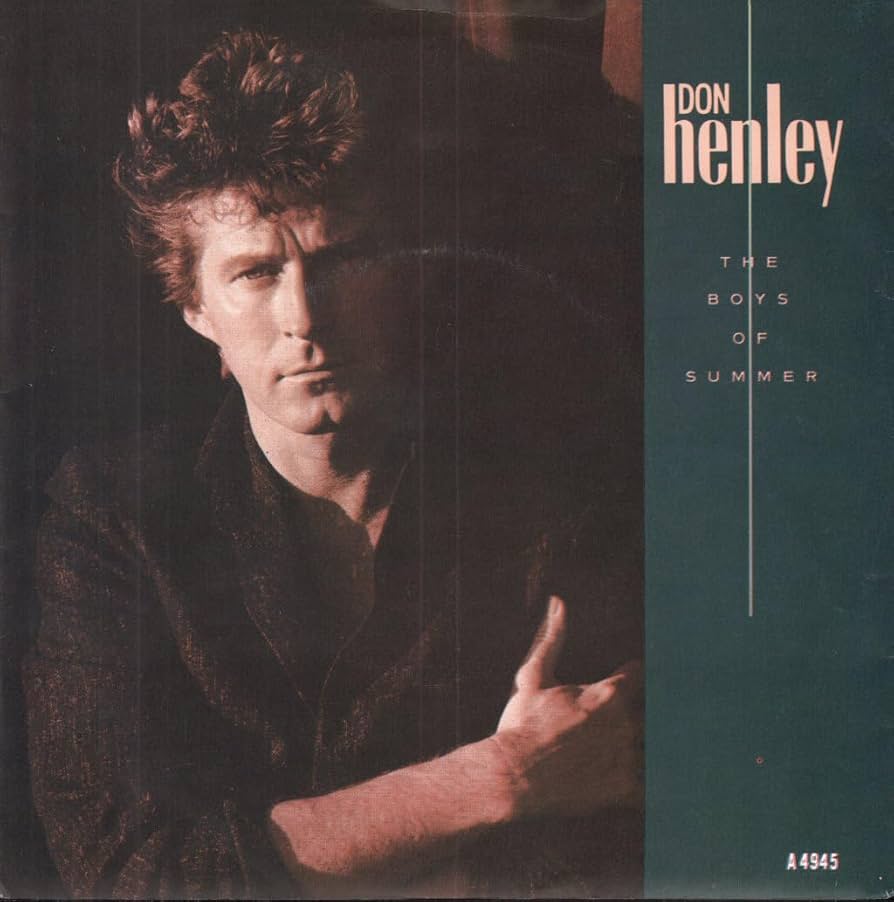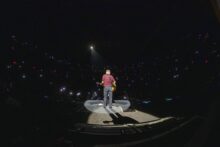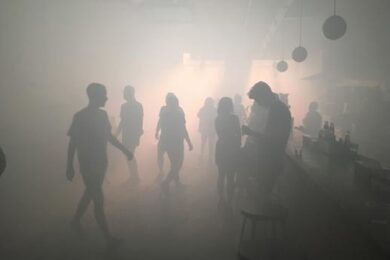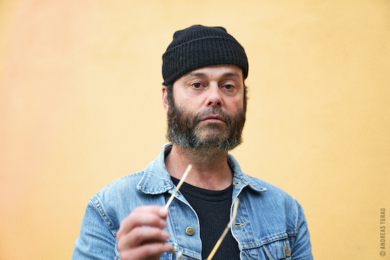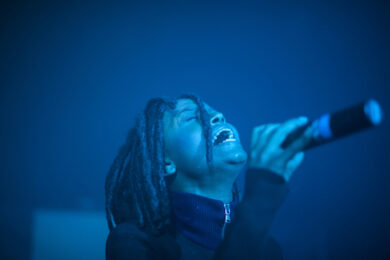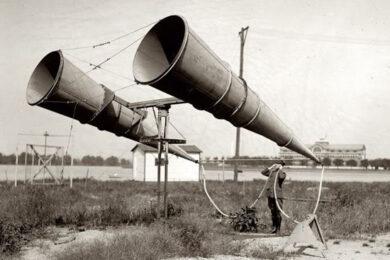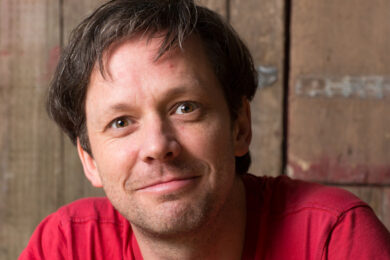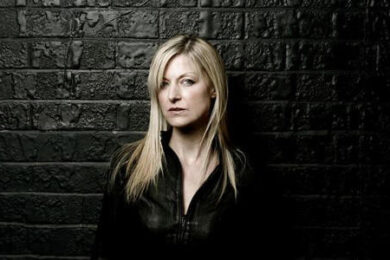One of the unique things about the 1980s was that history, as a process, felt curiously tangible. Something was happening, and this epochal shift wasn’t just perceptible publicly, in the changing landscape outside our doors – whether multicoloured trading-floors or monochrome industrial wastelands – but in the much-vaunted privacy of our own homes. Listening to the radio in the mid-80s involved a series of sonic shocks, as the familiar was systematically defamiliarised. The massive, gated drums and agitated clip of Bruce Springsteen’s ‘Dancing In The Dark’, the spookily spacious synthetics of Kate Bush’s ‘Running Up That Hill’, or the processed skitteriness of Don Henley’s ‘The Boys Of Summer’ were, on paper, merely obsolescence-avoiding makeovers of 70s stars. Yet what could have been purely technical process was often magical, luminous – the past didn’t just imbricate the present in such tracks, it haunted it, testifying to a history not just being ideologically shaped by abstract forces but emotionally resisted by living people. It wasn’t that these songs’ mournfulness and anxiety contradicted 80s pop’s joyfulness and positivity but that these polarities constituted the genre’s emotional complexity, its processing of change.
Released in autumn 1984, ‘The Boys Of Summer’ was the trailer single for former Eagle Don Henley’s second solo album, Building The Perfect Beast, its title signalling that awareness of the era’s social adjustment. Yet while Henley’s 1982 debut I Can’t Stand Still had lightly modernised his sound, its hit ‘Dirty Laundry’ was still rock in a new pop age. If the origins of ‘The Boys Of Summer’ as a demo by another 70s rocker, Tom Petty & The Heartbreakers guitarist Mike Campbell, hardly augured change, the resulting collaboration was a startling departure from either’s previous work. Campbell’s instrumental track was a solarised negative of rock, and although Henley’s voice was still recognisable – his wistful rasp always the ghost in the Eagles’ well-oiled machine – it inhabited a transformed landscape of shiny synth-riffs and processed Dire Straits-y guitars, driven by a nervy, new-wave pulse.
Tick-tick-tick-tick / Tick-tick-ticka-tick palpitates the opening electronic hi-hat, testifying that, as automation sidelined workers, Henley (one of few drummers anyone could name) had been replaced by a drum machine. Given that ‘The Boys Of Summer’ concerns an older lover rendered obsolete by newer, shinier models, and that Henley had just turned 37, the song’s meta-levels are signalled from the off. So, its sonic landscape can be heard as a digitised analogue of the political landscape, where anxiety and loss are components, rather than contradictions, of 80s positivity and gloss (A-ha’s ‘Take On Me’, the same year, has a similar feel). Emerging from tinny alarm-clock radios, musclebound ghetto-blasters or privatised Sony Walkman cassette-players, ‘The Boys Of Summer’’s evocation of sunshine was so suffused with loss that it sounded spectral, otherworldly, uncanny. It still does.
Look beneath the hood, and the landscape of the lyric is itself uncanny, non-literal, a dreamscape. The opening verse evokes an unnamed city (LA being an easy guess), whose streets, beach and lake are all mysteriously deserted. If this is a metaphor for summer’s end, or a pathetic fallacy for the narrator’s feeling of abandonment, it’s so extended it threatens to eclipse the story. “The sun goes down alone,” indeed. Henley’s use of his patented mythic register suggests this new chill in the air isn’t just the season changing but the times-a-changin’, a cold snap it’ll take more than legwarmers or a sweater round the shoulders to counteract. There’s a spell over the city, a glamour – a term whose changing historical meaning captures the era’s complexities. After the dowdiness, anti-materialism and collectivism of the late 70s, the 80s was defined by stylishness, consumerism and individualism. Ronald Reagan and Margaret Thatcher systematically dismantled collectivity’s institutions (industry, unions, councils) while deriding its cultural manifestations (strikers, socialists, hippies), making the acquisitive yuppie the poster-boy for the new politics, a personification of 80s glamour. This social engineering was resisted, however, its sublimation of greed satirised by Harry Enfield’s consumerist Essex boy, Loadsamoney and electronicist Essex boyband Depeche Mode’s ‘Everything Counts’. “The grabbing hands grab all they can”, Martin Gore coos: “all for themselves after all”, Dave Gahan caustically adding, “It’s a competitive world!” The corollary of such materialist individualism was social atomisation – “Wise up folks. We’re all alone out there”, Nick (William Hurt) declares in 1983’s The Big Chill – splendid isolation for the era’s winners, colder comfort for its losers. It’s indicative of ‘I Love The 80s’ nostalgia that The Big Chill’s meaning has been lost to ‘chill-out’ music and fetishisation of shrinking leisure-time (‘chilling’), while the greatest amnesia of all is reserved for the biggest chill of all: the Second Cold War of 1979-85. The fact that Nena’s ‘99 Red Balloons’ is now known mostly in its German version (‘99 Luftballons’) and that Prince’s ‘1999’ is heard through post-crash hedonism obscures 80s pop’s suffusion with nuclear anxiety. As Reagan and Thatcher ramped up tension with the Communist Soviet Union in aggressive promulgation of capitalism, Nik Kershaw’s ‘I Won’t Let The Sun Go Down On Me’ and Men At Work’s ‘It’s A Mistake’ in 1983, Ultravox’s ‘Dancing With Tears In My Eyes’ and Frankie Goes To Hollywood’s ‘Two Tribes’ in 1984 reflected the public’s anxiety about where such competitiveness would get us. Dreams of desolate, razed post-nuclear landscapes were one of few things democratically distributed during the 80s – accessories not included. So, the city’s depopulation in ‘The Boys Of Summer’ is both an evocation of glamour in the old, occult sense – the spell of neoliberalism – and its consequence in the contemporary, consumer-cult sense: a precog vision of an empty America after a nuclear event. There’s nothing left for the grabbing hands to grab hold of.
Tracking away from this magical realism, the second verse of ‘The Boys Of Summer’ sets out the emotional realities: the ageing narrator’s fixation on the lover lost to the lure of newer, younger competitors. He insists he’ll get her back, prove the value of vintage in the era of Flip and flea markets, show he can produce, not just service (“Remember how I made you scream”). But his macho bluster sounds hollow (especially keened at the edge of Henley’s range), his haunting of his ex’s house forlorn, somewhat creepy, although the concept of ‘stalking’ had not yet gained currency. The narrator, it’s becoming clear, is one of the era’s losers; someone on the wrong side of history. Indeed, he wonders whether his longed-for past “was a dream”; whether the relationship was the way he remembers it: her making him crazy and him making her scream could be from anger rather than arousal, after all. Doubt placed, the song pauses, time suspended, a liminal space in which damped guitars click, synths float, fretless bass oozes and lonesome, seagull-like guitars waft overhead. Then suddenly a brusque guitar-riff calls time on this reverie and ushers in the reckoning of the final verse.
During his incessant driving around the city, the narrator spots “a Deadhead sticker on a Cadillac”. More terms lost to history. ‘Heads’ were hippies and in the mid-80s there were still ‘head shops’ in most towns, peddling bongs, joss-sticks and patchouli oil. ‘Deadheads’ were fanatical followers of the Grateful Dead, a tie-dyed embodiment of the counterculture, and, by the 80s, its ghost, a demographic out of joint. So, the bumper-sticker – likely the Dead’s skull insignia – represents a morbid attachment to something that’s lost – the yuppie’s hippie youth; the narrator’a love affair; an inability to mourn and move on that Freud called ‘melancholia’. Freud would call the “little voice” inside the narrator’s head the superego, as it admonishes, “don’t look back, you can never look back”, but we might call it ‘80s ideology’. “Those days are gone forever / I should just let ’em go” the narrator chides himself. Henley’s own account is harsher still, insisting such hippie-haunted yuppies aren’t just in denial about the compromised present but an idealised past: “I don’t think we changed a damn thing, frankly”. This makes ‘The Boys Of Summer’ an update of The Doobie Brothers’ 1978 yacht-rock doozy ‘What A Fool Believes’, a past that’s not just irretrievable but delusional: “trying hard to recreate what had yet to be created”. Or as ‘The Boys Of Summer’ puts it: “I thought I knew what love was / What did I know?” After all that fuss Henley’s gloss shrinks the song to a small mean thing – but what does he know? Because, via a masterfully turned “but…” ‘The Boys Of Summer’ doesn’t end with the verse’s admonition against nostalgia but with the chorus’ assertion of the past’s potency. He can see her, radiating 80s glamour: salon-tan, wet-gelled hair, sunglasses, the model of the consumer ideal. But with Wayfarers themselves a revival from the past, and the lover “smiling at everyone” (not just the narrator) evoking inclusivity rather than inconstancy, a countercultural openness, the past is very much alive in the repeat-to-fade present.
Instead of the counterculture being a metaphor for lost love in ‘The Boys Of Summer’, therefore, the lost love is a metaphor for the counterculture. ‘Love’ had a collective meaning in the 60s’ endless summer – ‘All You Need Is Love’, Love being “in love with almost everyone”, The Zombies declaring the ‘Time Of The Season’ being “for loving”. The disappearance of this usage since the 80s is a result of the social engineering that ‘The Boys Of Summer’ both reflects and rejects. The track captures the turn – of the season; of the times – the yuppie haunted by the hippie he once was, by a society that was once social, by a time when desire for a better world wasn’t unworldly. The contrast between the 60s and the 80s is captured by the concept that connects them: ‘freedom’. Despite their anti-60s rhetoric, Reagan and Thatcher coopted the counterculture’s concepts to conservative ends: but while countercultural freedom was the pursuit of collective liberation after the repression of the 50s, neoliberal freedom was liberation for some purchased by the repression of others. In the unequal opportunity of market freedom some would purchase Cadillac Sevilles and live in luxury duplexes; others would walk and live in cardboard boxes.
If the 80s was as much about losing as winning, as much about melancholy as joy, and as much about the past as the present, ‘The Boys Of Summer’ might be the ultimate song of the era. A dialogue – a struggle – between past utopianism and present realism, the hippie 60s haunting the yuppie 80s, ‘The Boys Of Summer’ is uncanny, eerie, suffused with loss, yet luminous with longing. For all its melancholia, therefore, it’s ultimately a song of hope – and that’s the biggest haunt of all.
Toby Manning’s Mixing Pop And Politics is out now on Repeater.

